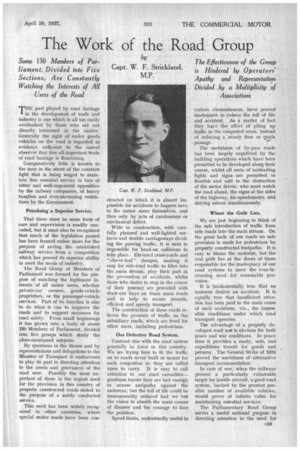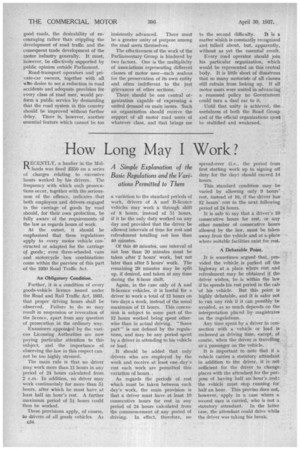The Work of the Road Group
Page 91

Page 92

If you've noticed an error in this article please click here to report it so we can fix it.
Some 130 Members of Parliament, Divided into Five Sections, Are Constantly Watching the Interests of All
Users of the Road The Effectiveness of the Group is Hindered by Operators' Apathy and Representation Divided by a Multiplicity of Associations by Capt. 'W. F. Strickland, M.P.
THE part played by road haulage in the development of trade and industry is one which is all too easily overlooked by those who are not directly interested in the matter. Generally the sight of motor goods vehicles on the road is regarded as evidence sufficient to the casual observer that this all-important trade of road haulage is flourishing.
Comparatively little is known to the man in the street of the constant fight that is being waged to maintain this essential service in face of hitter and well-organized opposition by the railway companies, of heavy ta.xation and ever-increasing restrictions by the Government.
Penalizing a Superior Service.
That there must be some form of care and supervision is readily conceded, but it must also be recognized that much of the legislation passed has been framed rather more for the purpose of saving the established railway service from a competition which has proved its superior ability to meet the needs of industry.
The Road Group of Members of Parliament was formed for the purpose of watching the legitimate interests of all motor users, whether private-car owners, goods-vehicle proprietors, or the passenger-vehicle services. Part of its function is also to do what it can to improve the roads and to support measures for road safety. From small beginnings it has grown into a body of about 130 Members of Parliament, divided into five groups which study the afore-mentioned subjects.
By questions in the House and by representations and delegations to the Minister of Transport it endeavours to play its part in directing attention to the needs and grievances of the road user. Possibly the most important of these is the urgent need for the provision in this country of properly constructed roads suited to the purpose of a safely conducted service.
This need has been widely recognized in other countries, where special motor roads have been con structed on which it is almost impossible for accidents to happen save to the motor users themselves, and then only by acts of carelessness or mechanical defect.
Wide in construction, with carefully planned and well-lighted surfaces and double carriageways dividing the passing traffic, it is next to impossible for head-on collisions to take place. Elevated cross-roads and " clover-leaf" designs, making it easy for side-road traffic to filter into the main stream, play their part in the prevention of accidents, whilst those who desire to stop in the course of their journey are provided with draw-out bays on these main roads and so help to secure smooth, efficient and speedy transport.
The construction of these roads relieves the pressure of traffic on the subsidiary roads, which are freed for other users, including pedestrians.
Our Defective Road System.
Contrast this with the road system generally in force in this country. We are trying here to fit the traffic on to roads never built or meant for such congestion as they are called upon to carry. It is easy to call attention to our road casualties— goodness knows they are bad enough to arouse antipathy against the motorcar, but the toll of life could be immeasurably reduced had we but the vision to absorb the main causes of disaster and the courage to face the problem.
Speed limits, undoubtedly useful in certain circumstances, have proved inadequate to reduce the toll of life and accident. As a matter of fact they have the effect of piling up traffic in the congested areas, instead of inducing a steady flow or quick passage.
The usefulness of by-pass roads has been largely negatived by the building operations which have been permitted to be developed along their course, whilst all sorts of misleading lights and signs are permitted to flourish and add to the distraction of the motor driver, who must watch the road ahead, the signs at the sides of the highway, his speedometer, and driving mirror simultaneously.
Where the Guilt Lies.
We are just beginning to think of
the safe introduction of traffic from side roads into the main stream. On the great bulk of our roads no safe provision is made for pedestrians by properly constructed footpaths. It is easy to blame the motorist, but the real guilt lies at the doors of those responsible for the inadequacy of our road systems to meet the ever-increasing need for reasonable provision.
It is fundamentally true that no motorist desires an accident. It is equally true that insufficient attention has been paid to the main cause of such accidents. viz., the impossible conditions under which road transport operates.
The advantage of a properly de
veloped roadus s is obvious for both peace and war conditions. In peace time it provides a ready, safe, and expeditious transit for goods and persons. The General Strike of 1926 proved the usefulness of alternative transport accommodation.
In case of war, when the railways present a particularly vulnerable target for hostile aircraft, a good road system, backed by the greatest possible number of available vehicles. would prove of infinite value for maintaining essential services.
The Parliamentary Road Group serves a useful national purpose in directing attention to the need for c33 good roads, the desirability of encouraging rather than crippling the development of road traffic and the consequent trade development of the motor industry generally. It must, however, be effectively supported by public opinion outside Parliament.
Road-transport operators and private-car owners, together with all who desire to see a reduction in road accidents and adequate provision for every class of road user, would perform a public service by demanding that the road system in this country should be improved without further delay. There is, however, another essential feature which cannot be too insistently advanced. There must be a greater unity of purpose among the road users themselves.
The effectiveness of the work of the Parliamentary Group is hindered by two factors. One is the multiplicity of associations representing different classes of motor user—each zealous for the preservation of its own entity and often indifferent to the just grievances of other sections.
There. should be one central organization capable of expressing a united demand on main issues. Such an organization should receive the support of all motor road users of whatever class, and that brings me
to the second difficulty. It is a matter whfch is constantly recognized and talked about, but, apparently, without as yet the essential result.
Every road operator should join his particular organization, which would be represented on this central body. It is little short of disastrous that so many motorists of all classes still refrain from linking up. If all motor users were united in advancing a reasoned policy no Government could turn a deaf ear to it.
Until that unity is achieved, the usefulness of both the Road Group and of the official organizations must be stultified and weakened.








































































































































































